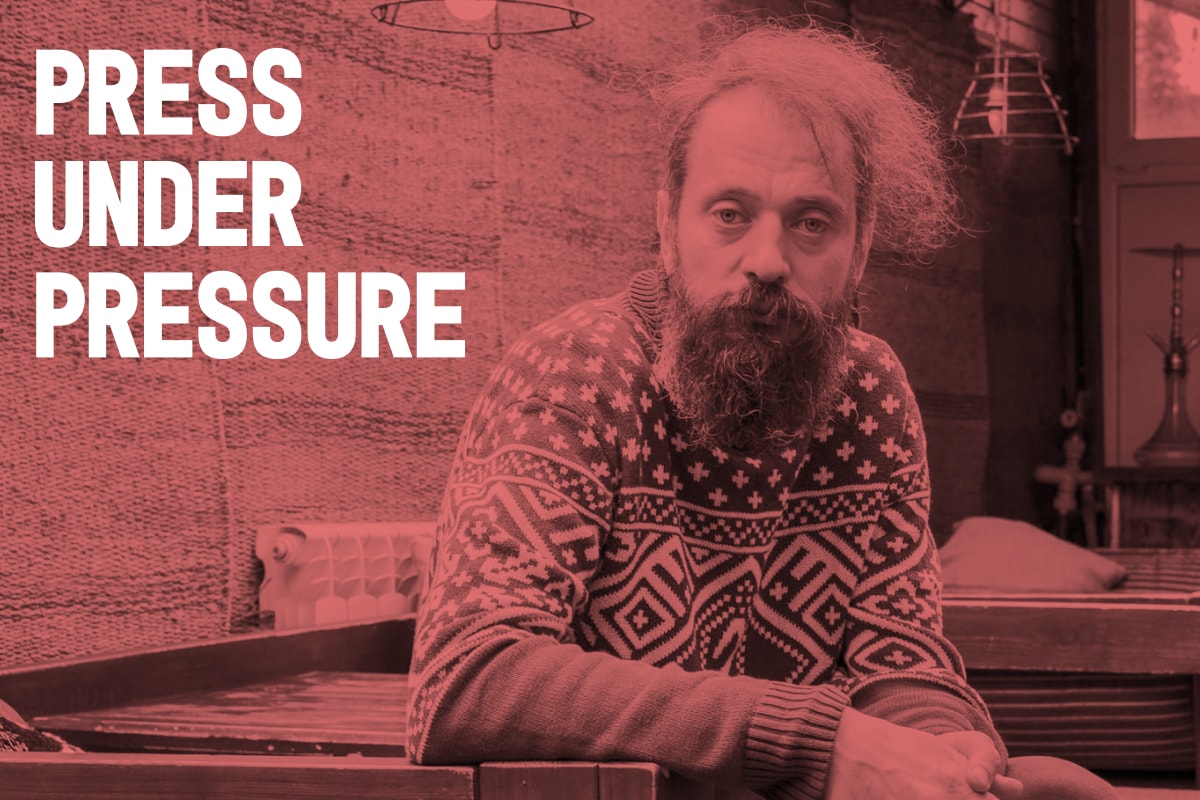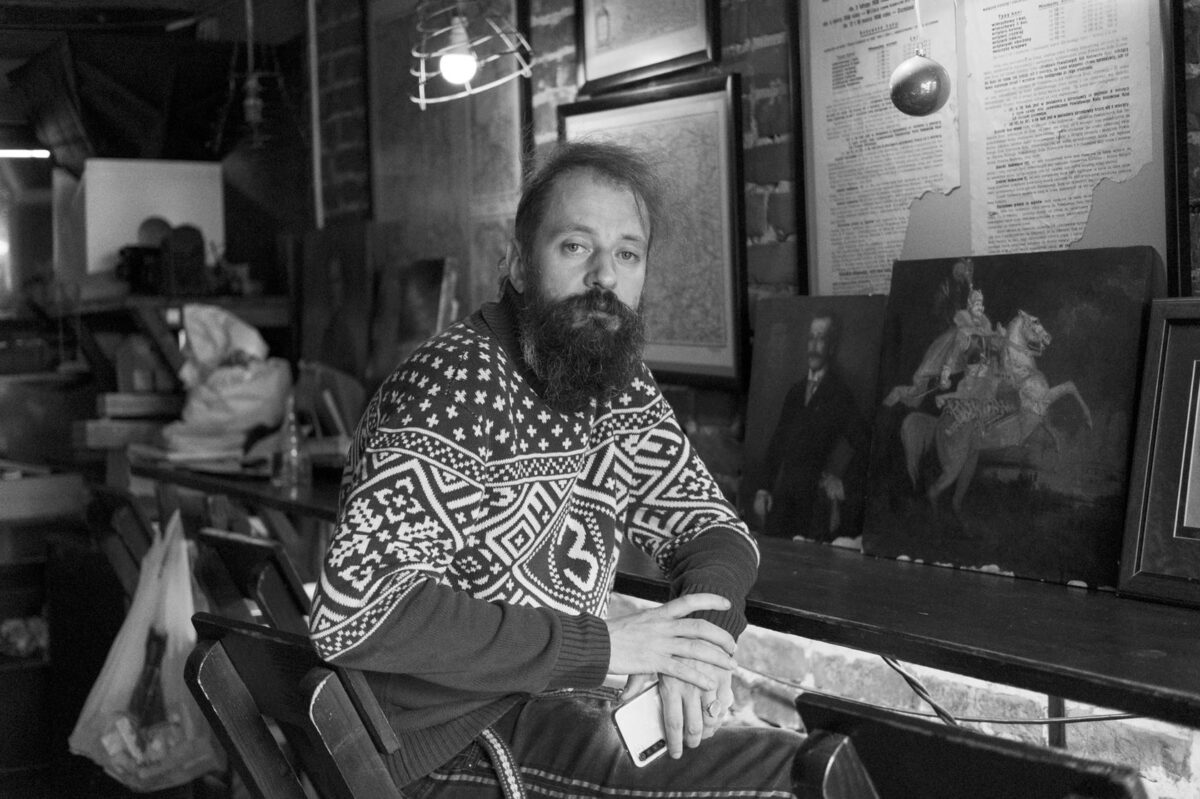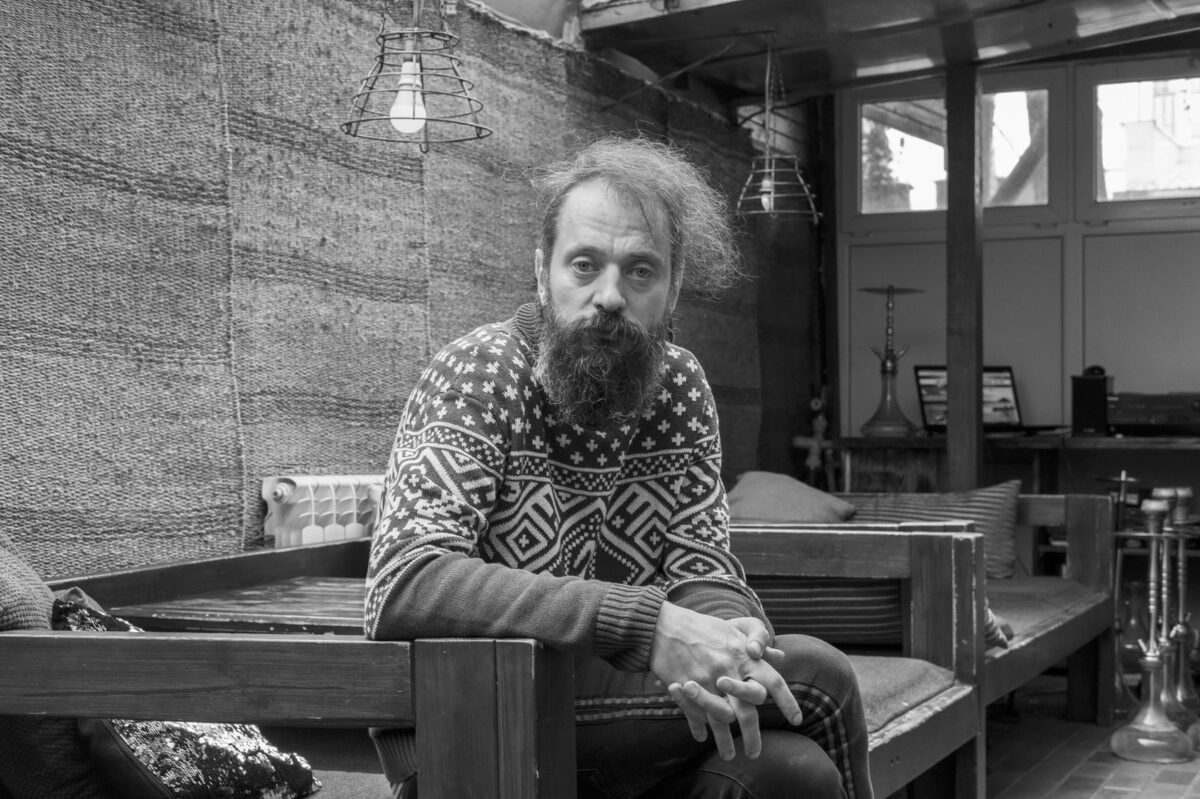
Ivan Muraviev was detained together with a friend while working on August 11, 2020. They were dragged out of a car in the city centre and pushed into a paddy wagon. The reason for the arrest was photos and videos from the protests, which were found on his friend’s phone. Then there was an interrogation in an office stained with blood, a night on the street, and the isolation unit in the pre-trial detention center on Okrestina Street. Ivan told us about his experiences as a detainee.
Two years later, on August 29, 2022, Ivan Muraviev was detained for the second time – by employees of the Investigative Committee in Minsk. He was charged under Part 3, Art. 361-1 of the Criminal Code of the Republic of Belarus (participation in an extremist formation).
On December 26, 2022, in the Minsk City Court, the political prisoner was sentenced to two and a half years in a penal colony. The process was carried out behind closed doors. The verdict was handed down by Judge Alena Shilko. He served his term and was released on December 3, 2024.
August 11, Tuesday. My friend and I were driving in his car. I was working on an assignment from a Russian TV channel Zvezda. They asked me to shoot some videos and stand-ups. The equipment I usually work with was taken away from me a week before, when we were making a film about Lukashenko’s women. That is why I was using my phone to shoot videos.
It was six o’clock in the evening, still a couple of hours left before some street activities were to start. Near the Yubileinaya Hotel there were a lot of prison vans. We saw checkpoints and piles of bicycles on the bike lane. I held my phone high to take a picture. And then our car was stopped by a traffic policeman.
Two riot policemen came running up. They had a bright, piercing stare. They started screaming.
I am a citizen of the Republic of Belarus, an adult person. And some guys with crazy, violent eyes run up to me, swear at me and demand something from me. Without any prosecutor’s authorization, without any charges. It was a kind of shock to me!
We showed them our phones. In my friend’s phone they saw the photos from the previous night near Pushkinskaya metro station. They saw that he was among the protesters, near the barricades. In my phone, there were just neutral pictures taken during the day. We were immediately pulled out of the car and stuffed into a prison van. They started to beat us with truncheons and curse us.
I do not know what a kind of person a judge should be to sentence people to administrative arrest for using obscene language. I know only one thing – those guys were the only ones using these kinds of words. Sometimes people can do it in an unusual, intellectual way: using witty expressions, various euphemisms, emotionally nuanced words. As for those guys, they would just say: “Hey you …, go here, go there, …»
They beat me for about two minutes and then threw me into a partitioned cell called a “stakan”, or “beaker”. There were already three people in it. One of them had a wound on his hand, and was trying to stop the blood using the white-red-white opposition flag, because of which he had been arrested. The second guy had been taken out of his car, and had just been driving somewhere. The third one had simply been riding a bike along the bike lane.
My “beaker” was at the very end of the van, and there was a slot through which and I could see what was going on. The prison van was filling up for two or two and a half hours. They did the same thing: threw a person in, yelled at them and beat them. A man in the neighbouring cell shouted that he suffered from asthma, that he needed medicine. But they did not care.

Ivan Muraviev
After two and a half hours, the van was now taking us somewhere. On the way, we were beaten.
Then they shouted, “Arms behind your back! Head down!» and kicked us out of the truck. They took us to a gym, which looked like the ones you see in schools. Later it turned out that it was the gym of the Pervomaisky district police station. They forced us to kneel, with hands behind our necks, head against the floor. We were lined up along the wall.
I tried to look around a little bit, and noticed that almost all the guys in blue trousers with stripes had some kind of a dancing gait, with their hips swinging. Interesting.
I was interrogated at about 12:30 a.m. The procedural norms were not observed: they did not explain why I was detained, and no charges were brought. They just asked me about my name, surname, date of birth, where I lived, nationality. One person said that he was Russian. They started beating him and shouting, “Why did you come here? You want another Khabarovsk here?”, referring to the city in Russia where protests were also taking place.
Another story: a guy said he was an Ossetian. They told him the same thing, but this time recalling the conflict in his republic. I do not know how they get their brains washed, but as far as I can tell such political zombification lessons run through all conflicts. Well, at least they know contemporary history…
I listened to the conversations of the police officers and tried to remember their names. Later, I found them on the Internet, and they look just like regular guys. One of them has recently helped to find a stolen kid’s bicycle.
Another nice major used my back instead of a table while he was questioning a guy next to me. He put a paper on my back and wrote down the information. Then he told me to crawl to the side, so that he could continue.
They checked if people had tattoos. Those who had them were badly beaten at once.
There was another guy, a drug addict. They started beating him right away. “We’d better… do it here: you’ll kick the bucket anyway!” I cannot cite what they actually said.
They showed us a bag with some white substance in it and shouted: “Whose is this?” Of course, no-one admitted anything. I think they were trying to frame somebody. Later, when I was led to a pile of belongings to pick up my phone, I saw that this bag was in the pile. Anyone could take it.
Then they dragged me out for interrogation. They pushed me into some office and threw me on the floor. There was blood on it. They forced me to stand with my head against the wall. They wrote that I had taken part in the rally. I wrote that I did not agree with the report, because there had been at least three hours left before any rally was scheduled.
After the interrogation, they brought me back to the gym. There I saw a man who had a blood pressure crisis. They poured water on him. He asked for Validol, and was told that Validol was just a mint candy, and it would not help him anyway.
They started checking the phones again. In one of them, they found something and started yelling. “Oh, there you are! We were looking for you!” The guy was pulled out of the gym and beaten along the way. Then they brought him back. He had been beaten very badly. He clearly had concussion, as in the morning he vomited and fainted in the toilet. But he got no medical aid. The doctors took him away only when he was at the detention centre. There was another guy with his arm and leg both badly swollen. He could not kneel, and could not walk. He was also taken to hospital from the detention centre. That is, 24 hours later.
In the morning, they asked, “Who wants to eat?” Of course, everyone was hungry. We hadn’t had anything for a whole day already. But they were not going to feed us. It turned out that they asked it just to make fun of us.

Ivan Muraviev
In the evening, the detainees were taken to Okrestina detention centre in groups. Upon arrival, we were stuffed in a yard with concrete walls, and a metal grille instead of a ceiling. The floor was also made of concrete.
In the morning, there were already 150 people there. There was no toilet, no water. There was a man, named Roman, in his 50s. I think he had been to prison before. He gave us two loaves of bread, saying, “Buddies, you must be hungry. Sorry, but we don’t have any food from outside, there’s nothing more to share.” Two loaves of bread for 70 guys a piece as a gift from local prisoners! I am very grateful to them. Roman said that he earned his living by renovating flats, and on 9 August he had just gone out for a drink after work. He explained to us the rules of conduct. He also managed to arrange for us to be taken to the toilet, to a cell which was inside.
The night was very cold, and the floor was made of concrete. I never thought that I would be so happy hugging so many guys! We hugged to keep warm. It was freezing cold.
At two in the morning, more guys were brought in. They all had their pants cut. Numbers were written on their legs and backs. From one to 25. For some reason, 23 and 19 were missing. These guys said that first they were brought to Frunzensky district police station, and the riot police guys said that they no longer had names. Only figures: “Now you will be called by numbers”. Perhaps, these police guys decided to practice some arithmetic.
At three in the morning, I was kicked out of my cell. I realized they could no longer cope with the quantity people that they had brought in, and decided to release those they had not managed to convict. I understood this from their conversations. I did not sign anything except the first detention report, where I wrote that I disagreed.
During all that time, I always understood where I was, and tried to keep silent and not to demand my rights, if possible. I knew I would do everything I could when I was free and relatively safe.
Guys, a very useful tip: just keep your mouth shut. Try not to resist, but if there is no choice… There was a person, who was hit with batons on his legs, forced to jump and shout “I love the riot police». Yes, you can stand and keep silent. But what’s the use? You’re better off talking about it when you are released. But when you are still in jail, you are under total control of these beasts: you can do nothing except make them even angrier. Unless you are a Superman, or Batman, do not make them angry. People who did not understand this were beaten harder. Much harder. Someone was hit with an electric shocker.
One of the guys in black who beat me suddenly asked, “Who do you love?»
I answered nothing. I certainly do not like guys in black. And he said, “And I love Belarus”. He did not seem to know that those were [the nationalist writer} Kalinovsky’s words. Their heads are all messed up! They take a bit here, and a bit there, but cannot make sense of things. According to them, what they were doing to us was an attempt to save the country’s independence. In this way, they allegedly teach us fools not to sell out Belarus.
I was pulled out of the prison gate. There I was met by volunteers. They gave me a blanket, some food, let me make a call, and found a car that took me home.
I live near Riga shopping mall, a place where confrontations took place and street barricades were built. When I came to the entrance, I felt like crying: the entrance door was propped open, and there was a bottle of water and a bag of medicines inside.
I have arrived at the following conclusion: while the majority of my prison mates were detained accidentally and did not participate in the protests, now they are ready not only to participate, but to bring bricks and crow-bars with them.
I think it all has not been in vain. It has been a kind of a “building brick” in the recognition that we are a single nation: that we have become united as a nation. Mutual help, compassion, empathy – all this grows steadily.
Terms and conditions
Partial or full reprint is permitted subject to following terms of use.
An active direct hyperlink to the original publication is required. The link must be placed in the header of the reprinted material, in the lead or the first paragraph.
Reprints, whether in full or in part, must not make changes to the text, titles, or copyrighted photographs.
When reprinting materials from this page, attribution must be given to the Press Club Belarus “Press under Pressure” project, collecting evidence of repression against independent media and journalists in Belarus.